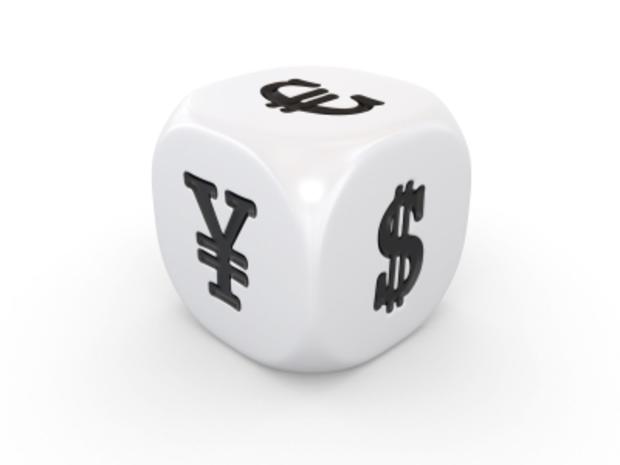Scared of U.S. Bonds? Why Not Go Global?
Last weekend, The New York Times ran a story about international bond funds. Couldn't have been more timely: You need income investments for your retirement portfolio, and you're dying to break free of the nano-yields on money funds, but you're wary of U.S. bonds because of all the talk (including on MoneyWatch) about the coming rise in interest rates and decline of the dollar. The logical place to look is overseas, to international bond funds, and lots of other investors are doing just that. The Times noted that $3 billion flowed into international bond funds for the week ended March 31, a record.

All in all, international bond funds have the earmarks of the next Really Hot Idea for retirement investors. That alone ought to make you suspicious.
Let's start with three reasons foreign bond funds seem to make sense:
1. The U.S. federal budget is a mess. Moody's is threatening to downgrade Treasuries. Ben Bernanke is warning that the U.S. budget is headed off a cliff. A foreign bond fund lets you invest in fiscally sounder countries, like Germany, Australia and Canada. Nobody is threatening to downgrade them.
2. Eventually, the U.S. will be forced to let inflation explode, so that it can repay its debt in devalued dollars. But if you put your money in bonds denominated in other currencies, a dollar crash works to your advantage. (To get this benefit, you have to buy a bond fund that's not hedged back into the dollar; most funds are not, but the prospectus will make that clear.)
3. Financial planners continually urge you to invest more in foreign stock funds, as a way to capture growth abroad and diversify away risk. If foreign stock funds are good for you, foreign bond funds should be too, right?
All very plausible. But not that simple.
It's true you don't have to look very hard to find countries with tighter finances than ours. But that doesn't mean you'd want your mom to own their bonds. The reason: currency risk. Exchange rates bounce all over the place and your international bond fund shares will bounce with them. For example, the unhedged PIMCO Global Bond fund (PGBDX), a Morningstar "best in category," owns only high-rated debt and yet it's three times as volatile as a U.S. standard like the Vanguard Total Bond Market Index (VBMFX). The difference is all due to currency.
The problem is, bonds are supposed to be the safe part of your portfolio. It was Treasuries and high-quality corporate bonds that saved your portfolio's bacon in the crash of 2008, remember. You'd want your bond funds to do the same next time stocks take a header, as they surely will.
You may tell yourself you can stomach a little currency risk if it protects you from the inevitable inflation brought on by Uncle Sam's profligacy. But wait: Who says inflation is inevitable? History suggests little correlation between a country's debt load, interest rates and inflation. If there were, then Japan, the world's Olympic gold medal borrower, would rival Zimbabwe for inflation. Instead, it's mired in deflation. Scott Mather, the manager of PIMCO Global Bond, thinks the U.S. might share Japan's propensity for deflation, at least in the short run. If he's right, high-grade domestic entries, like the Vanguard (VBMFX) or Fidelity (FBIDX) bond market index funds, would benefit.
What about the dollar: Isn't it virtually a sure thing that the buck will decline as the U.S. fritters away its gold-plated credit rating? And isn't a foreign bond fund the perfect hedge? Francis Kinniry, the Vanguard Group's portfolio strategist, says no.
If I had a dollar for every time I heard "it's different this time," I wouldn't have to work any more. Interest rates globally in the developing world-the major G7 countries-are moving in a common direction and U.S. is still the leading economy. If U.S. lost its triple A rating, and I'm not saying it will, it would still be the highest quality investment out there today.As for the "inevitable" weakening of the dollar: the greenback has actually strengthened this year. That runs contrary to expectations, but not contrary to currency markets' habit of utterly confounding investors in the short run. While it's not a bad idea to keep a good chunk of your money in assets not denominated in dollars, the best way to do that is through stock funds. They give you access to profit growth abroad-not just bond yields--and their returns aren't overshadowed by currency fluctuations.
Then you can let your bond funds do their main job of keeping your portfolio safe and sober. The standard financial planning advice is that you should only own bonds that pay interest in the currency you use to buy food and shelter. If you buy that advice, foreign bond funds make all the sense in the world-as long as you're a foreigner.
More on MoneyWatch
Bond Funds: Bubble Ahead
Are Bond Index Funds Flawed?
Is Vanguard's Total Bond Fund Right for Your Portfolio?
Disclaimer: The copyright of this article belongs to the original author. Reposting this article is solely for the purpose of information dissemination and does not constitute any investment advice. If there is any infringement, please contact us immediately. We will make corrections or deletions as necessary. Thank you.

